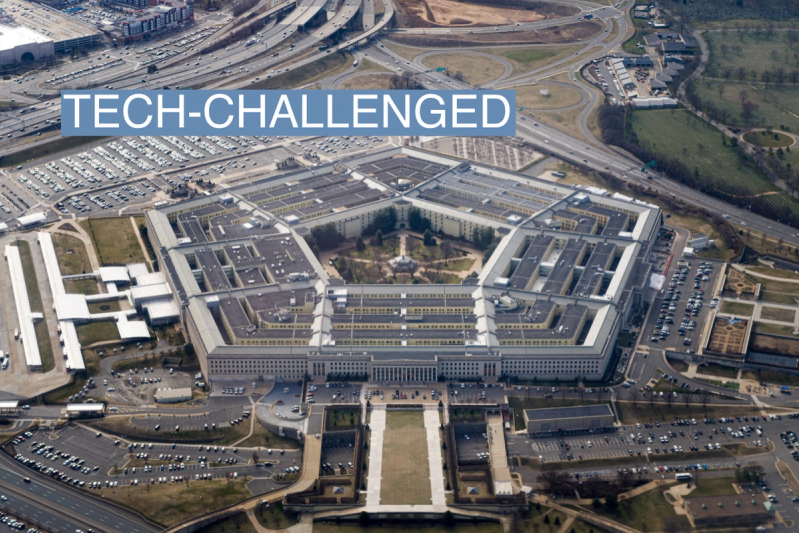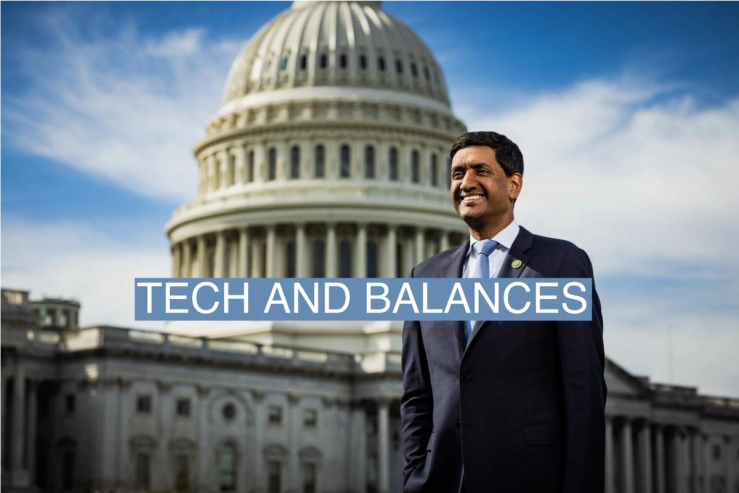The Scene
Congressman Ro Khanna has represented Silicon Valley as it increasingly became a Washington target, from Facebook’s 2016 election scandal to current fears about artificial intelligence.
Throughout, the progressive lawmaker, who was co-chair of Big Tech critic Bernie Sanders’ presidential bid, has called for a more balanced approach to the industry. I talked to him about AI, China, and what he thinks about Elon Musk in an edited conversation below.
The View From Ro Khanna
Q: Through the lens of Silicon Valley and tech competition, is the U.S. in a cold war with China?
A: We’re not and we need to prevent a Cold War. That’s the task of statesmanship. That’s the task of political leadership with imagination.
It’s easy — a war. What we need to do is rebalance the economic relationship, reduce the trade deficits, bring back production to the United States, and provide significant deterrence on Taiwan so that there is no military invasion.
But, at the same time, we engage with China. Our commitment to the one-China policy is the peaceful resolution of that.
Zoom, for example, is the product of a Chinese immigrant, so I am not for a complete decoupling. I am for a rebalance.
Q: The latest large language models are mostly coming out in the U.S. and not in China. Does that say anything?
A: We have a lot of advantages in private sector, commercial AI. But the question is how much of that AI is being adopted by the military and in our national security.
AI is data dependent, which is harder for us because we’re not as data dependent. But there’s no doubt that we have an incredible lead.
Q: What worries do you have about the rise of AI? And if Washington is quick to regulate it, do we risk stifling innovation and potentially give China the advantage?
A: We have to be aware of the impact AI technology could have on jobs, disinformation, and our nation’s cybersecurity. Congress must craft smart and careful regulations to prevent any harmful uses of AI that won’t stifle innovation.
Q: Do you have any specific asks for OpenAI on what they should be doing or not doing?
A: We certainly need transparency and they should be providing feedback on where they see the risk areas. And then we need to work with a group of AI leaders and ethicists — many of them are in my district or at Stanford — to help us get ahead of the curve so that we come up with a policy framework that is smart.
One of the biggest worries is in healthcare. Do you want this dispensing medical advice? How is it going to treat or respond to someone who is depressed?
Q: There’s a lot of disruption happening with all the tech layoffs and now this AI technology.
A: There has to be a balance. There was a reflexive celebration of tech without seeing its blind spots. Then the pendulum swung and there was no recognition of all the good that tech does.
Are there excesses? Absolutely. Are some companies taking advantage of their own position? Yes. Do we need to have proper antitrust regulation? Yes. But we also have to celebrate the positive things they’re doing.
Q: Yeah, there are people saying the Democrats pushed Elon Musk away.
A: I’ve always engaged with him and I think he’s a brilliant entrepreneur. One of the most talented entrepreneurs in the world. But that doesn’t mean I don’t let him know I think he does things that are wrong, and I disagree with him. But I engage with him.
Q: Do you think you could get him back on the Democratic side?
A: I don’t know about that but he’s someone that we should be engaged with and he still has a very positive view of President Obama.
Q: Are you paying attention to what he’s doing with Twitter as somebody who uses that platform?
A: I’ve been more engaged with him on issues of American manufacturing. But on Twitter, I joked to him, why would anyone want that job? Who wants to call the balls and strikes? It’s like you’re the umpire in the World Series and you’re going to get yelled at no matter what you do.
Q: Have you seen a shift in your constituents in Silicon Valley to be a bit more patriotic?
A: I do think that they’re patriotic because our national security is going to depend upon the AI advancements, quantum advancements, and small drone advancements that are being made in my district. But I understand the complexity of the relationship.
For example, if you want to lower the trade deficit with China, one of the things to consider is that we are a massive exporter of semiconductors. So how do you do that without having the most sensitive chips end up in the hands of the [Chinese Communist Party] or the Chinese nuclear authority.
These are not easy issues. You can’t just say, we’re going to stop all sales to China. You’d have even more trade deficits.
Q: We have the CHIPS act underway. It may be five years until we see a big change there. How is that going so far?
A: I helped write the CHIPS Act and I’m a big fan. It led to the two factories being built in Ohio and upstate New York. Those are the types of initiatives we need to rebalance our production.
From my conversation with the CEOs of Intel and Micron, they’re optimistic and they’re committed to Ohio and, and upstate New York. We need to make sure that [the Commerce Department] implements what Congress passed. As long as they do a good job, it will work.
Q: There’s this challenge of taking technology in the private sector and getting it into the military. That’s something we did better during the Cold War and some of those muscles maybe need to be built up again. Where do you think we are on that?
A: The model has changed. Before the technology was developed at DARPA [the Defense Advanced Research Projects Agency], at NSF [the National Science Foundation], and it was the Department of Defense fueling the innovation and then spreading that out to Silicon Valley, fueling a lot of the private sector success.
Now the Department of Defense has written about 14 critical technologies, 11 of which are being developed in the commercial sector. And you have the [Defense Innovation Unit] that is funding some innovative startups, but they are not able to have their technologies adopted by the Department of Defense. So how do we get the leading edge commercial technologies adopted by DOD?
That is the core issue. The committees that [Rep] Mike Gallagher (R-WI) and I are leading are core to a modern national security strategy to tackle China and to defend Taiwan, which is not going to be able to win a conventional war against China.
They need to have asymmetrical deterrence, and that’s going to require cyber, small drones, missile defense, and AI.

Q: Do we need a new agency to facilitate that?
A: That’s the focus of what I’m trying to do on the House subcommittee. The question is what do we need to do to facilitate adoption? How do we get the DOD budgets on these new technologies? Is it reshaping some of the bureaucracy? Is it figuring out how to get the DOD to take more risk in these new technologies to adopt it?
Q: Should the U.S. be spending more on R&D as a percentage of GDP?
A: That was what I started in the Endless Frontier Act. The question was how do we get to 1% of GDP? I originally came up with a proposal of $1 trillion over 10 years and [Senate Majority Leader Chuck Schumer] said, appropriately, this is never going to pass. So we did $130 billion over five years, which is the largest increase in investment in science and research in modern history since the Kennedy years. It’s a massive increase in NSF funding for AI, for quantum, alternative proteins, electronics manufacturing.
Q: What do you think of the whole tech leaving California debate?
A: Give me a break. It’s not true. Come to my district. The Apple spaceship isn’t moving anywhere. The Google sprawl isn’t going anywhere. It still costs way too much to buy a house. We’ve got Tesla still producing a lot. If we can get tech more distributed, great.
But Silicon Valley is still leading in so many areas, in biotech, in AI, in quantum. Every 10 years, they write about the death of Silicon Valley, and they always turn out to be wrong.


